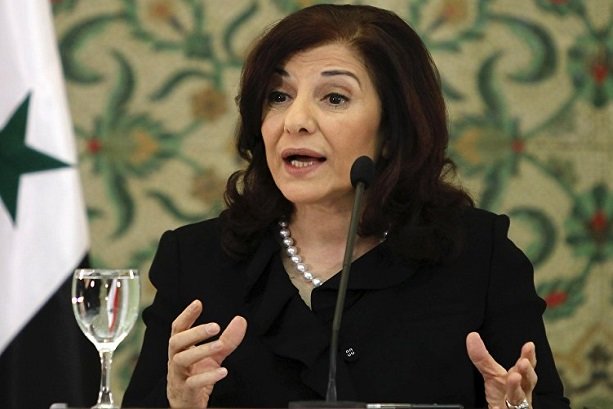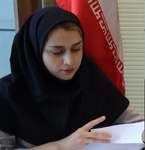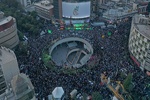Following is the special interview of Maraya International magazine with Media Adviser to Syrian President Bashar al-Assad Boutaina Shaaban:
Since 2011, a destructive, Islamist-oriented war has been waged against Syria. Who wanted to destroy Syria in the name of Islam? And what were they aiming at by launching this war in collusion with the Zionist entity?
Just like the so-called 'Arab Spring' struck Libya, Iraq and other countries in the Middle East, this vicious war aims at destroying our countries, armies, economies, cultures and identities by our bitter enemy i.e. the Zionist entity.
However, Turkey's Erdogan has proved to be a key player in destroying Syria, driven by his Ottoman dreams as a prominent leader of the Muslim Brotherhood organization, which had attempted to topple the Syrian government back in the 70s. It has been unequivocally proven that Muslim Brotherhood is deeply connected with the Zionist project and foreign intelligence agencies.
As a sovereign state supporting the resistance, Syria acts as the 'crown jewel' for all Arab nations. Syria stood by the Lebanese Resistance in 2006 and with the Intifada [uprising] of Gaza in 2008. The Axis of Resistance is clearly manifested in the meeting that took place in Damascus between President Bashar al-Assad, Iranian President Mahmoud Ahmadinejad and Hezbollah's Secretary General Sayyed Hassan Nasrallah.
Setting the scene for the war on Syria has undoubtedly taken place years ago in terms of fighters, arms provided and logistical support. Were the reforms made by President Assad at the beginning of the crisis meant to calm down the demonstrators, or did he really want to bring them in?
Mr. President genuinely wanted to implement those reforms. Had the demonstrations been unprompted, the crisis would have ended long time ago. Mr. President himself headed a meeting for Al-Baath Regional Leadership on March 24th, 2011 to endorse a wide range of reforms in response to the people's demand, and which were officially announced later in a press conference.
Nonetheless, the more responding we were, the higher those demands rose. Later, we realized that those demonstrations were pre-planned to destroy Syria.
The Syrian people have withstood 6 years of global war. What are the main factors behind such resilience?
In fact, there are several factors. First of all, the Syrian people are deep-rooted in this land for over 10,000 years and known to be greatly affiliated with their homeland; they have triumphed over the invaders ever since. Secondly, the one and unified Syrian Army which offered and continue to offer huge sacrifices to preserve the country. Thirdly, the wise leadership headed by Mr. President, who bravely fought back and defended Syria.
You've been with President Assad throughout this war. How do you view his approach to this war compared to his father the late President Hafez Assad?
In terms of adhering to homeland and making sacrifices, they are identical. But the circumstances have changed. This war is entirely unprecedented in the history of the region with 150 countries financing, arming terrorists and plotting to destroy Syria, not to mention the 860 km-long borders with Turkey; a country which supported terrorists and granted them safe and easy access into Syria. There are also Qatar and Saudi Arabia which almost entirely bankrolled this war.
Syria has provided unparalleled support to the Palestinian movements, especially Hamas in spite of its hostile stance towards President al-Assad during the war.
What does Palestine represent for Syria's strategic vision? And has such vision been negatively affected after attitude Hamas'?
Palestine is Jerusalem, Al-Aqsa Mosque, the Church of the Holy Sepulchre, the birth of Jesus Christ, and the indigenous people. Thus targeting Palestine means targeting whole Arab World, and whoever defends Palestine is defending himself.
The Zionist entity seeks to take over not only Palestine, but also the entire Arab region. The fact that Resistance defends Palestine as well as the entire region is not yet fully comprehended by the vast majority of Arab regimes.
We embraced and supported Hamas as a resistant movement even though we knew it was part of the wider Muslim Brotherhood project, which was adopted by Hamas leaders during the war against Syria.
Syria has been, and will always be on the same front with the Resistance based on our belief to re-make the Palestinian cause the first priority.
And here comes the imperative question: why didn't Syria launch any military operation in the occupied Golan Heights during the past years?
This question has been raised repeatedly to doubt the role of Syria. All the resistant movements in Lebanon and Palestine are fully aware of the key role undertaken by Syria in supporting such anti-Israeli project. However, launching a military operation on the Occupied Golan Height is subject to specific considerations related to countries, which are completely different from those of the resistant movements.
The US and its allies imposed many sanctions on Syria in various fields. How did Syria manage to withstand these sanctions? And to what extent these sanctions have contributed to the unity of the Syrian people and their persistence to win?
They tried to spread sectarianism among the Syrian people and use language which was entirely outlandish and unrelated to our civilization. However, those sanctions were confronted through enhancing our national unity and paying more attention to our own resources in agriculture, industry, handicrafts and others. Let's not also forget that the cooperation with our allies: Iran and Russia has been critical in facing these challenges.
Russia took part in Syrian war at the request of the Syrian leadership in 2015.
Where has Russia been since the beginning of the war? Did Russia intervene when it felt that its interests are at stake?
The basic problem lies in what the Western MSM (mainstream media) is promoting, especially concerning Russia's intervention. In the same context, up to 80% of the Arab media outlets are owned by Saudi Arabia, which are also working in collaboration with the West and the Zionists.
Just like the new settlers in America, Israel seeks to obliterate the landmarks of Arab civilization to emerge as the only strong state in the region. Israel has once destroyed 'King Nimrod' and now attempts to destroy the ancient city of Palmyra.
Russia did not enter Syria on September 30th 2015; we must remember that on October 4th, 2011, Russia and China double vetoed a UNSC resolution aimed at conducting a military intervention in Syria. Russia and China have contributed to the protection of Syria from the very beginning because their role was constructive and positive.
How can we understand Russia's strong relationship with the Zionist entity - which is deeply involved in plotting with Takfiri groups against Syria - while desperately defending the unity of Syria and its leadership? In other words, how could Israeli warplanes bomb military outposts in Syria without being intercepted by Russian anti-aircraft missile system?
In politics, you should use the "art of possible". Russia signed an agreement with the United States on September 9, 2016, but the latter has not fulfilled its commitments; however Russian - American negotiations went on. Turkey, on the other hand, shot down a Russian fighter jet; still both countries engage in talks until today.
Russia is a superpower who maintains its own interests and calculations, so its relations with the Zionist enemy do not affect the unity of Syria, its cooperation with the Syrian leadership and Syrian army.
To what extent does Syrian leadership trust Russia's Putin?
The Syrian leadership has absolute and unlimited confidence in Russia under the leadership of President Vladimir Putin. We are consulting with our Russian ally in almost all matters. In fact, Russia's perspective and standpoint are different from those adopted by Western countries; it [Russia] believes in maintaining the sovereignty of other countries, and preserving their independence, freedom and dignity.
Lebanon's Hezbollah has openly aligned itself with the Syrian Arab Army and the Syrian leadership since the beginning of the war. Did both leaderships have a clear vision which resulted in such mutual understanding of events? And how do you assess the role of Hezbollah in Syria?
Hezbollah's commendable role in Syria has been extremely pivotal and significant, and genuinely reflects its identity as a resistant movement. Syria and Hezbollah maintained a clear and identical vision from the very beginning since both fight in the same front to achieve the same objective and project. We were aware that this war meant to destroy Syria first, Hezbollah then the Islamic Republic of Iran.
Had Hezbollah failed to win the battle of Qalamoun, Lebanon would have been overrun with terrorism. Whoever advocated the 'self-distancing' policy without taking into account the geopolitical and identity factors failed to understand the political dimensions.
Being a strategic and key player as well as a political negotiator in the Syrian war, what is the main role undertaken by Iran in supporting the steadfastness of Syria? Is it true that Iran offered President Assad and his family a safe asylum in Iran?
Iran is a trustworthy ally which played a key role in the steadfastness of the Syrian people; our friendship dates back to the victory of the Islamic revolution. The late President Hafez Assad stood by Iran when Iraq's Saddam Hussein waged a war against it. Our relationship with Iran has a common and important bond which is to liberate Palestine.
There is a media and political party that believes Syria would have been spared the havoc, deaths and suffering if President Assad had relinquished power. Why didn't President al-Assad resign from office? Did he consider such a proposal?
It was not about relinquishing power rather than abandoning Syria. President Assad thinks of himself as a legitimately-elected leader who has been entrusted to preserve the country's sovereignty, unity and the principles it stands for.
President Assad said that after liberating Aleppo, Syria will be different. What is the importance of Aleppo victory?
By liberating Aleppo, Syria has triumphed; all major Syrian cities are now under the control of the Syrian government, not to mention that Erdogan's project in Aleppo was completely fizzled out.
The huge quantities of supplies and weapons left by the terrorists after being forced to leave Aleppo reveal the gigantic support provided by western countries, Turkey and some Arab states to the terrorist groups. Henceforth, all their claims about fighting terrorism turned to be blatant lies because they were the main backers and masterminds of terrorism.
Through Maraya International magazine, what would you like to say to the Syrian people and allies after six years of war, with the victory looming in 2017?
I'd like to thank the Syrian people and those who defended, fought and prayed for Syria, the Syrian Arab Army in particular, may God have mercy on the martyrs' souls, and may the wounded have quick recovery.
I also want to express deep thanks to our allies: Russia, Iran and Hezbollah, for standing by us all the way. The Sykes-Picot agreement, that the enemy wants to end, seeking a colonial domination on the region, must be nullified by us in order to establish a true oriental Middle East that genuinely reflects our Arab and Persian civilizations. We all came from the same region, same resistance, and our goal is also the same.
Russia's role in the war is to be highly commended for proving false the theory of unipolarity.
Boutaina Shaaban is a Syrian politician and is currently the political and media adviser to the President of Syria. Shaaban served as the first Minister of Expatriates for the Syrian Arab Republic, between 2003 and 2008, and has been described as the Syrian government's face to the outside world.
Interview by: Fadi Boudaya



























Your Comment